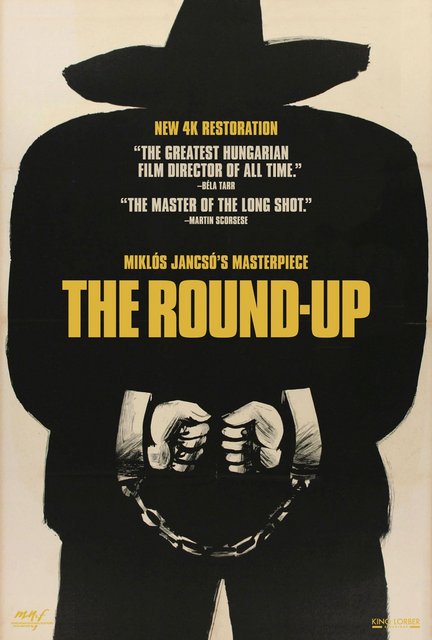
THE ROUND-UP (1966)
Directed by : Miklós Jancsó
The Round-Up is unlike any other film I've really looked at and tried to understand. It marches forward purposeful in it's determination to disorientate the viewer, and if a narrative strand starts to take shape it very purposely cuts it, then cauterizing the wound. If for a moment we start to wonder if things are meant to be this way then this is confirmed as we soon notice the faces of the various prisoners that are characters in the film - they're afraid, and just as confused as us. We're one of them. We never get to be a fly on the wall during strategy sessions the prison staff might be holding. Their various ways of weeding out the worst of Sándor Rózsa's guerrilla band are always happening, and the cast of characters always changing - promises of clemency, threats and tricks doled out by one group who has total power over the other. A time-honored game of marches, bags over heads, tiny dark cells, hangings, shootings, torture and mind games. In the meantime, lies and deception become reality.
Here we have the subjugation of prisoners, abuse of power, interrogation techniques and demoralisation down to a very unfamiliar 19th Century artform. Amongst it we see things we are familiar with today - the bags on heads for instance, which made it's return when the United States became openly nasty in it's campaigns in the Middle East (it has to be noted though - as far as warfare is concerned, other nations can be far nastier.) If there are reminders of Abu Ghraib or Guantanamo Bay it's because the parallels are striking. Prisoners have one rich resource which those in power want to take from them - and that's information. To do that they have their resolve completely crushed, so they don't care anymore whether it is taken from them. Seeing a prisoner in Round-Up run around ratting on all his brothers because he's become obsessed with absolving and saving himself is the result of the way the guards psychologically worked him over in previous scenes - and they don't even need to execute him anymore. The prisoners will take care of that. Then the prisoner that killed him will be worked over.
Miklós Jancsó films all of this on the steppes of Hungary, giving us wide open nothingness and a feeling of complete isolation. It's as if nothing else exists anymore. He expands it further by allowing elements such as horses to leave the shot and then cross back into it, or having the camera leave the confines of a cramped room into the perfectly flat, never-ending landscape. There's no real protagonist in this film - we never stick with a character, and although it's always obvious some kind of trick is being played out on this or that prisoner, we're never quite sure what the endgame is as far as how it's meant to play out. It's the ultimate in confusion, and as such gives us an absolutely spot-on perspective of being hopelessly played with by powerful forces who will most likely kill you at some point, but will hold out enough hope that you'll do their bidding no matter what that might be. They tell you that you'll never see your family again, and then in the very next breath that you're free to go. It's never been so scary to hear "you're free to go" - because what the jailer obviously means is you're free to go to the afterlife in the next few moments.
Glad to catch this one - screened in the Cannes Classics section of the 2015 Cannes Film Festival.

Watchlist Count : 448 (-2)
Next : Across 110th Street (1972)
Next : Across 110th Street (1972)
Thank you very much to whomever inspired me to watch The Round-Up.
__________________
Remember - everything has an ending except hope, and sausages - they have two.
We miss you Takoma
We miss you Takoma
Latest Review : Le Circle Rouge (1970)












